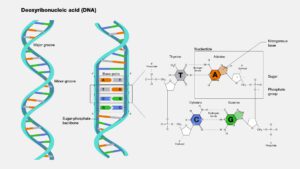DNA Tests
#GS-03 Science and Technology
For Prelims.
About DNA:

- DNA, or deoxyribonucleic acid, is the hereditary material in humans and almost all other organisms.
- DNA is made up of a chain of molecules called Nucleotides.
- Each nucleotide contains a nitrogen base, a sugar group and a phosphate group.
- Four possible nitrogen bases can be present in DNA; Adenine (A), Thymine (T), Guanine (G) and Cytosine (C).
- Each molecule of DNA is a double helix formed from two complementary strands of nucleotides held together by hydrogen bonds between G-C and A-T base pairs.
- DNA was first recognized and identified by the Swiss biologist Johannes Friedrich Miescher in 1869 during his research on white blood cells.
- The DNA structure is described as a double helix.
- The double helix structure of a DNA molecule was discovered later through the experimental data by James Watson and Francis Crick.
- Human genome is composed of 46 DNA molecules of 24 distinct types.
For Mains.
Concerns of DNA testing:
- DNA tests are considered as occupying a grey area in legal and moral terms, oscillating between protection from self-incrimination and encroachment on individual privacy to the “eminent need” to unearth the truth.
- They can be of help as evidence in a criminal case or in proving a claim of marital infidelity or paternity.
- DNA Forensics Laboratory Private Ltd., accredited with the National Accreditation Board for Testing and Calibration Laboratories (NABL), says it tests 300 to 400 samples a month on private requests and court orders. The numbers were only 30 to 40 till five years ago.
- The Supreme Court has held that compelling an unwilling person to undergo a DNA test would be a violation of personal liberty and right to privacy, turning the spotlight on a technology that aids the cause of justice but violates privacy.
- Women’s rights activists hold that a DNA test is the only tool which can deliver justice in cases of abandonment of mothers and children.
- Determining paternity is often considered essential to secure financial support from an estranged partner.




